WA Police say maps released by their police minister created a “serious concern for public safety” and could be used to “locate firearms”.
UPDATE: ‘Home invasion’ risk
SINCE releasing this story, we’ve received this following update on just how much of a risk Minister Papalia’s conduct presents to public safety. It’s a risk that WA Police say is “wholly unacceptable”. Check their update out:
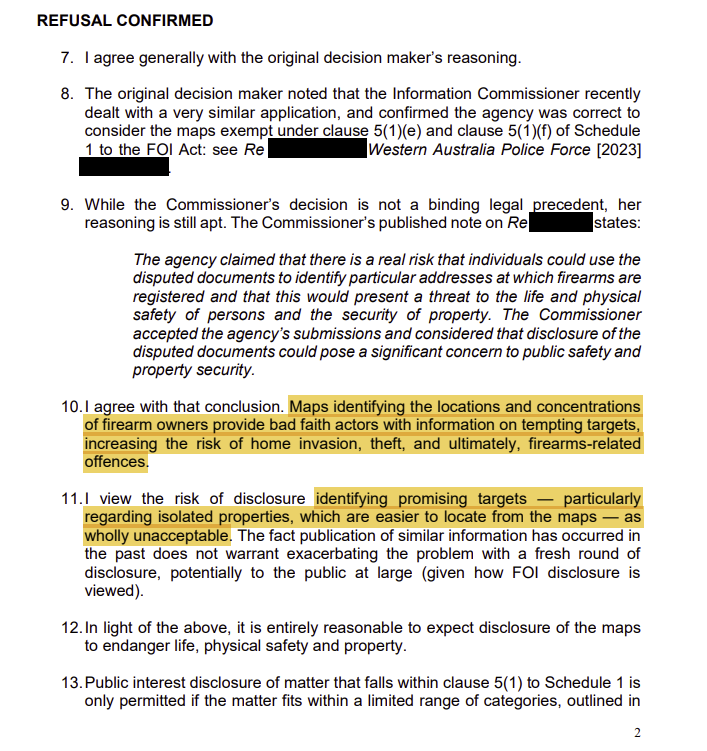
Prefer the audio version?
Betraying public safety – for political gain
IN MARCH 2022, several Western Australia media outlets published maps showing the locations of where licenced shooters live.
The maps were provided by the Minister for Police, Paul Papalia.
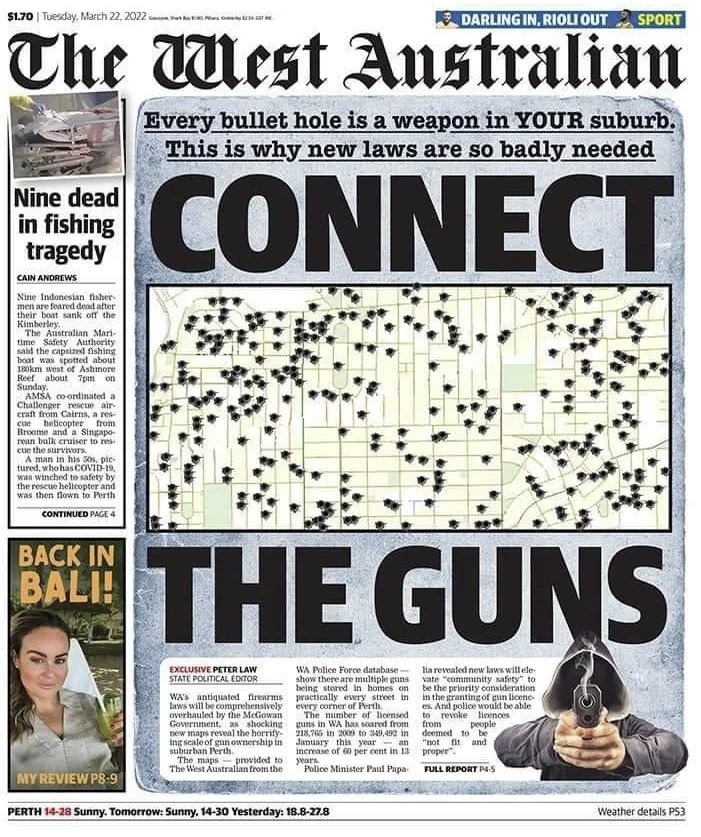
The rationale he used was that this supported his call for tighter gun laws.
However, it was obviously nothing more than a political stunt.
That’s because where shooters live was never an issue in it’s own right.
INCENSED by the release of sensitive privacy information, we, and other shooting organisations attacked Minister Papalia over what he did.
Hiding behind FOI
We put in FOI requests to WA Police get to the bottom of who provided the maps and what instructions they were given, by whom, and why.
WAPol refused to provide copies of what was provided to the media (through the minister).
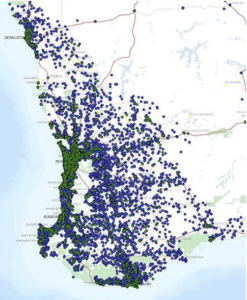
The reason they refused access was because the documents were now in the public domain.
That is one of the grounds they can legitimately refuse the application.
In other words, they said the maps were now available in the newspapers.
The FOI also revealed there were no written briefs provided to the minister to accompany the maps.
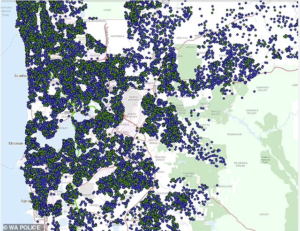
Anyone who has worked in government or politics will tell you that the fact no brief was prepared is highly unusual.
It means the minister’s office didn’t want anything in writing because it knew it would be FOI’d over this.
We also proved that the addresses of shooter locations could be revealed using open source software. You could easily work up a shopping list for thieves.
This is was reported in the media
The new challenge – public safety
HOWEVER, one member of the public who was also knocked back under FOI, had asked a slightly different question which focused on whether the maps provided to the media, were of the same resolution to what was published.
The applicant sought an internal review of the decision.
 WA Police responded by saying it would be inappropriate for them to provide higher resolution maps because that could create a public safety risk.
WA Police responded by saying it would be inappropriate for them to provide higher resolution maps because that could create a public safety risk.
However, he was not after higher resolution maps.
He was after the maps that were provided to the media, regardless of the resolution that was used – and wanted maps of that same resolution.
That’s when the applicant complained to the WA Office of the Information Commissioner.
With our help, Commissioner Catherine Fletcher ruled in his favour.
The Commissioner’s decision
In it’s deliberation over the matter, the Commissioner’s office noted that:
“… because the disputed documents had been altered by the media outlets prior to their publication, the disputed documents – being documents held by the agency – were not publicly available”.
The ‘alteration’ the Commissioner refers to two things.
First, the maps that were published had superimposed dots and bullet holes over the locations.
Second, that the resolution had been changed.
The shock reason: changed to public safety
What came next was a startling conclusion. That was that releasing the maps that were provided to the media would endanger public safety and the security of property.
This is what the same ruling said:

Clause 5(1)(e) and (f) of Schedule 1 of the Freedom of Information Act 1992 are the grounds for which an agency can refuse access to the document. Those clauses state:
“(e) endanger the life or physical safety of any person; or
(f) endanger the security of any property”
… even though the minister had already provided those maps to the media.
New application to WAPol
Following this, the member of the public made a second application under FOI. However this time, it was to the minister’s office and in the context of the Commissioner’s ruling.
The minister’s office referred the application to WAPol to manage.
WAPol again refused to provide the documents – but their reason had changed. It now reflected the Commissioner’s advice.
Here’s what they (WAPol) said:
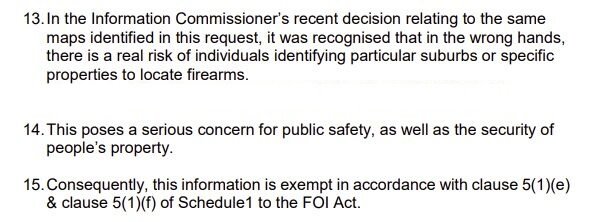
This was a significant admission by WAPol that releasing the maps that had already been provided to the media, would pose threats to public safety and property.
The WAPol response also drew attention to three new matters, namely:
- “that in the wrong hands“,
- the maps could be used “to locate firearms“, and that
- this was a “serious concern” for public safety and the security of people’s property.
These statements were all new information that were not in the Commissioner’s assessment.
Why the additional commentary?
This raises the question of why the police would provide that additional commentary?
Why didn’t they simply quote the Commissioner’s finding? We think we know why: it becomes important later on.
Under parliamentary privilege
In Parliament on 23 March 2022 (the day after the maps appeared in the media – and well before the Commissioner’s finding), Minister Papalia stated:
“the material that was released to the media went from my office but was prepared by the Western Australia Police Force. I do not have access to the databases or the systems that provide the visual representation that was presented to the media.
Obviously, it was delivered by the police, de-identified by the police and provided by the police.
Yes, we released it, but can I say it was with the full knowledge of WA police, because we actually asked them for some de-identified material.”
That, in our view, is an admission that the maps were requested by the minister. This raises the question of why he felt it necessary to have them in the first place.
It wasn’t as though the minister was trying to fix any actual problems with WA’s 90,000 shooters.
Nationals raise public safety questions
On 14 June 2022, Peter Rundle MP (The Nationals) asked Papalia about an incident involving a shooter who had been doused with methylated spirits and set light. The victim’s address was covered by the maps.
In response, Papalia said:
“I can again address the stupid claim that the member just repeated: there was no map and no possibility at all of that individual’s address being revealed by the maps that were published in The West Australian that were provided by the Western Australia Police Force.
It is disgraceful, it is shameful and it is embarrassing that he should continue to repeat that stupid suggestion. Do not do it again, member.”
The police’s admission that the maps could be used to locate firearms obviously backs Rundle’s concern.
Vincent Catania MP, also Nationals, had earlier asked a similar question on 6 April 2022 – where Papalia gave a similar answer.
Papalia’s contradiction
It’s pretty obvious that despite his protestations, the new information from WAPol means Papalia’s maps weren’t de-identified at all.

Paul Papalia, MP
Sure, names had been left out – and the media reduced the resolution prior to publication. However, WAPol’s statements mean the maps provided by Papalia were dangerously accurate.
Accurate enough to create, as WAPol said, the “real risk of individuals identifying … specific properties to locate firearms”.
It is now also obvious that Papalia’s claim that there was ‘no possibility at all’ of the maps revealing addresses contradicts the advice from WAPol.
It is a generally accepted convention that if a minister misleads parliament, they lose their portfolio.
Oh, a written brief would have been handy…
Perhaps the minister should have requested a written brief after all. That’s because having WAPol’s advice on paper would have given him someone to blame. Especially if it turns out the advice given to the minister was incorrect.
It also helps avoid any misunderstandings.
However, we’ve got another theory.
Remember that Papalia told parliament that the maps were released “with the full knowledge of WA Police”. That means the police knew what the minister was intending to do.
Also remember that the police added to the Commissioner’s assessment with new information. That is, that there was a “serious concern” that the maps could compromise public safety and security of property. They also spoke of the risk of the maps falling “in the wrong hands”. Also that the maps could be used to “locate firearms”.
Frank and fearless advice
It’s possible that because the police knew the minister intended to release the maps, that they might have objected to him doing that. That’s consistent with their concerns about the maps falling in the wrong hands.
If that’s the case, that could explain why the minister’s office would not want to be given a written brief.
That’s because the brief would have contained advice that was going to cut across the minister intentions. It is also likely the brief would have contained a recommendation to not release the maps.
Having a paper trail that shows the minister acted against the advice of his own agency would have been politically damaging to him.
Politicians are happy to be told the truth, but sometimes they don’t want it in writing.
That’s what we think might have happened in this case.
It’s only a theory – but it makes sense. It explains why no brief was provided – and it fits in with WAPol’s unequivocal position.
Privacy legislation is about public safety
Privacy legislation exists in most states to protect the public against the wrongful disclosure of private information by public agencies. It help prevent politicians from using private information for political gain.
The Federal Privacy Act 1988, as an example, has a number of ‘privacy principles’ which have the force of law. Breaching them can result in court injunctions or even civil penalties.
These principles not only cover the release of information but impose obligations on agencies to report where they breached those principles.
These requirements also state that agencies must notify the affected individuals when a privacy data breach that affects them, has occurred.
It’s about integrity.
Unfortunately, not in WA. WA not only does not have a state privacy act (as do other states).
However it would appear that the Federal Privacy Act 1988, may not apply to state agencies because of constitutional limitations. Other than in the health portfolio.
Where are the maps now?
There is no evidence to suggest whether WA Police or Minister Papalia have taken any steps to remove those maps from the hands of those who received them – being the media. Or to prevent them from falling “in the wrong hands”.
There is currently nothing in play to stop the media from, for example, using the maps again – or passing them onto someone else. Or, what is there to stop them from simply selling them?
In our view, the minister needs to ask those outlets he gave the maps to, to delete any copies they have. He should also explain why he is making that request.
Helping public safety – or helping crooks?
Police Minister Paul Papalia released the maps to papers that said that they reveal the “shocking new maps reveal the horrifying scale of gun ownership in suburban Perth”. They also said the maps show “why new laws are so badly needed”.
These are statements that clearly show the maps were released to support a public interest argument – at the minister’s request.
However WAPol’s current position means that the main beneficiary of the maps isn’t the public at all.
The only beneficiaries can be criminals.
THE UPDATE we gave at the beginning of this article confirms that. The risk of home invasions, theft and firearm related offences has just increased – and that comes from WAPol.
Before you go ….
Thank you for your support!
Shooters like you, who care about the future of the shooting sports have shown their amazing support for us.
It is with their support, that we’ve been able to bring you stories like this. The news we’ll bring you is unique, always well researched, and we do our best to make it as informative and easy to understand as possible.
If you haven’t seen our other articles, then please take a minute to check them out here.
Then, why not hop onto our email list or follow us on Facebook, YouTube or Twitter, or X?
That way you’ll stay on top of what’s happening in the world of shooting – and be supporting the organisation that is fighting for your sport!
Plus you’ll be getting our much loved podcasts!!
All for free! Plus you can opt-out at any time.
Why not put this on your club’s noticeboard?





Thank you for bringing us up to date with the situation in WA.
The ‘Truth’ shall out!!!
In light of the recent information, I believe Paul Papalia should be arrested, charged, and jailed.
Also that He and (/or the department) should be liable for any costs involved in relation to any incident arising or occurring due to the released information
So what’s the next step Neil? It’s easy to draw the conclusion that Papalia has potentially put the safety of legal firearm owners in jeopardy by releasing these maps, and that by doing so he’s also increased the likelihood of a stolen firearm being used against the group of people (ie; the non-shooting public) whose interests he claims to be trying to protect. However, I doubt the non-shooting public are sympathetic – most would probably see this as one more good reason to remove firearms from the community, whatever they think of Papalia’s motivation or methods.
Hi Lyndon. You’re dead right. It’s great that we found this, so we win the moral fight. In our eyes. We are still well behind in achieving that in the public’s eyes – and even further behind in the political world. It’s as though we let the house rot down around us. We’re definitely not going to give up and try to find other ways to get this into then news in WA (we’re still working on that) but the question you ask is spot on. It’s one that I might cite on this Friday’s podcast if that’s ok. Happy to leave your name out unless you advise otherwise. Regards Neil
Hello Neil. Has there been any increase in the number of firearms stolen in WA since these maps were released? Has there been an increase in firearm related crime? Is there any scope for a class action on behalf of WA firearm owners? Whether the citizens of WA are shooters or not, at face value it seems there’s evidence their government were prepared to take an action that put public property and safety at risk, and that they were made aware of that risk before doing so. Surely the media outlet that published these maps also shares some of the responsibility?
Hi Lyndon. Thanks for the contact. No. No information. We did FOI it but that info can’t be obtained because the work to match the thefts with the maps hasn’t been done. If there was evidence then yes, we could go down the class action route but we’d need access to information that we’re not entitled to get. It’s obviously a chicken-and-egg thing. I think your comment on sharing responsibility is why some, at least, won’t run with it. Still going to be trying to get some media involved this week though! Regards Neil
The problem here is that, regardless of the finding of any Commission, the harshest treatment Papalia will get is to say “sorry” in front of cameras.
A “sorry” from a politician is worthless… less than worthless… because their words carry so many falsities with an utter lack of integrity at all phases of their political lives, there needs to be more severe punishments for those who take an oath of public office and then break the sphere of trust. The punishments need to be greater – not lesser – when the trust of the public has been betrayed.
As for the maps: I can tell you exactly how that would have played out.
It would have been the media section in the parliamentary annexe putting in a request saying that it came from the Ministers office for the information. Those who administer and watch over the data would have refused at first and then, most-likely, had their jobs threatened if the information was not extracted and handed over. Normal Police Officers don’t have access to that information and it would have had to have gone to an IT area where someone had elevated access authorities in order to extract the data.
As I said, the people in the IT area would have initially refused at first and would have then been threatened with reprimand and potential loss of job for not giving the information over to people who should not have had access to it in the first place.
Chances are that the data would not have been de-identified either and now, meatheads in the media department will have the names and addresses of all those dot locators on the maps.